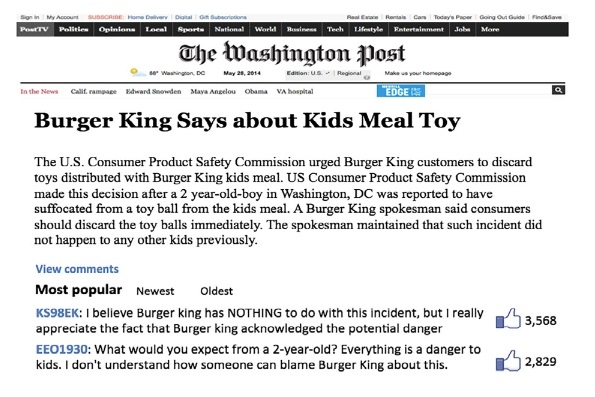Imagine you check Twitter one morning and find a story trending about a child who suffocated swallowing a toy from a meal at a fast food restaurant. You read the first news story that appears in your feed, then begin to look at some of the comments online. Of course, you begin to shape your own opinion as to whether the company or the consumer might be to blame.
Would you make up your mind on your own or be influenced by the tone of the news story? Would the reader comments influence your opinion?
In a recent social experiment, researchers Seoyeon Hong, Ph.D., of Webster University and Glen Cameron of the University of Missouri-Columbia, reached conclusions that not only are our opinions influenced by social media comments but those comments are, in fact, more influential than the raw information or the tone of the media story itself.
The experiment
The researchers polled 389 participants online. They showed them fictional news stories of companies facing a crisis followed by faux reader comments and social media “likes”. The participants didn’t know all of this was made up, they thought it was real.
All participants saw the same news stories, but different groups saw different reader responses. One group saw the news story followed by supportive comments from readers:
Another group was shown the same story but with negative comments.
The outcome?
Participants were significantly more likely to blame the company for what happened when the online comments blamed the company. By comparison people were significantly more likely to absolve the company of blame if the online comments defended the organization. Additionally, online comments with many “likes” were deemed more credible regardless of positive or negative tone.
Online comments change peoples’ minds more readily than the information or news content itself.
The science
The scientific theory to why this happens is contained within two elements. One is we have evolved to be social creatures who seek to fit in with society. We learned to co-operate in small groups or tribes to survive.
Another element is something called “heuristics.” We’re wired mentally to find mental shortcuts to conserve brain energy so when a large group of people appears to have reached a conclusion, we’re more likely go along with that. Moreover, there’s science showing we’re more likely to choose messages that are consistent with what we already think and feel and filter out messages that aren’t. In other words, we choose information that is agreeable with our established beliefs.
There’s a perception that online comments are made by friends and neighbours and, therefore, more objective. And in this day of information overload, online algorithms have been designed so comments that receive the most “likes” appear at the top of our feeds.
What does this mean for communications strategies?
- Technology isn’t just informing us, it’s influencing how we think
- The influence of social media and the “mob mentality” that can result is more powerful than ever. Social media is a feedback channel, not a broadcast channel
- Your business needs a crisis communications strategy with social media resources in place to help you manage your reputation when it needs it most
- Organizations that already have sound crisis communications plans in place need to revisit them as technology continues to evolve
- Third-party advocacy should play a key role in your crisis social media strategy – do you know your positive influencers are and are you sure they’re willing to help you in a time of crisis?
- Routine monitoring and evaluating of online comments are important to managing your reputation as well as crisis management assessments
